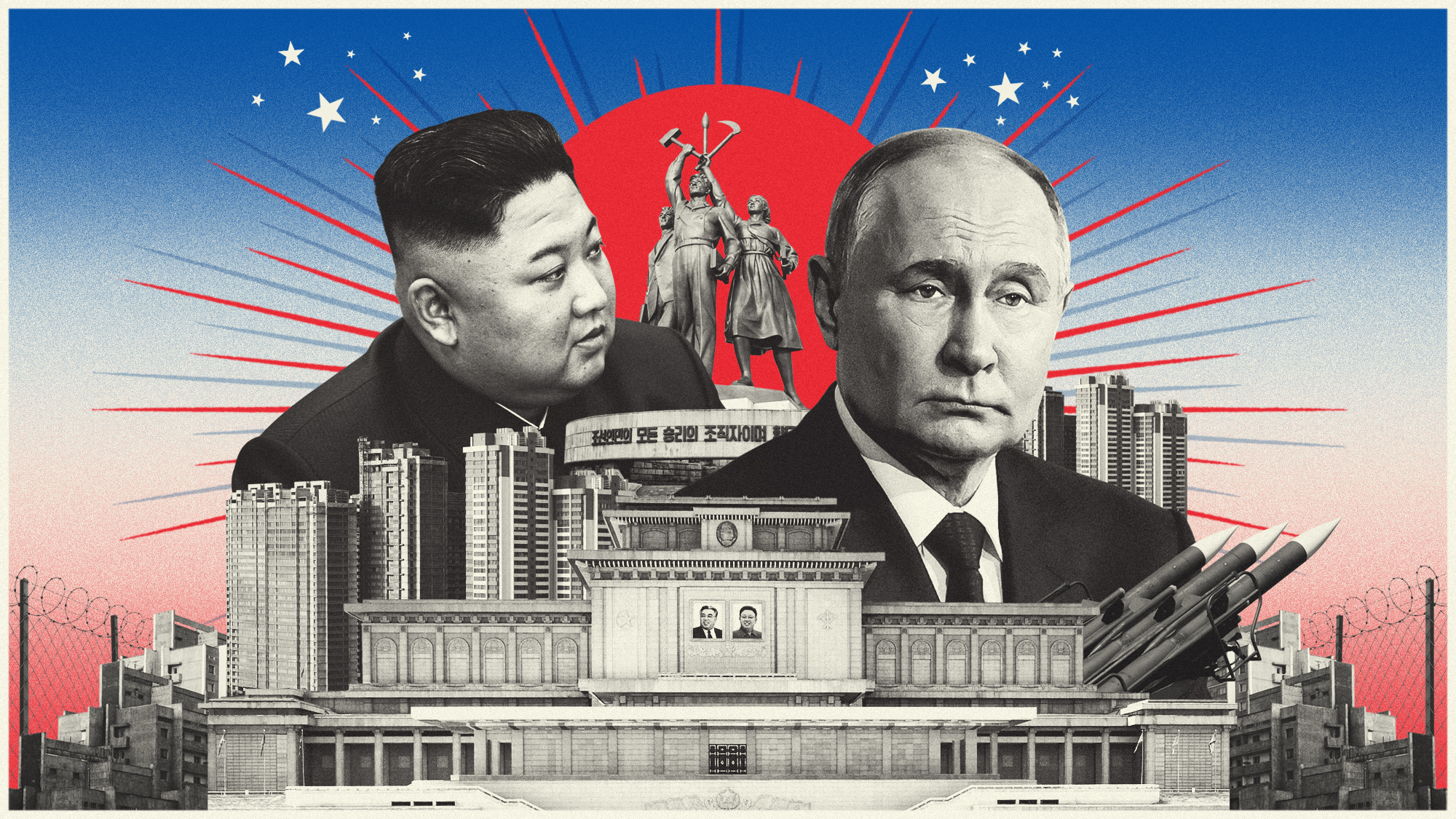Putin in Pyongyang: a return to the Cold War days?
Isolation and anti-Western agenda pushes dictators into deepening military alliance that 'undermines the security of Europe, Asia and the US'

A free daily email with the biggest news stories of the day – and the best features from TheWeek.com
You are now subscribed
Your newsletter sign-up was successful
It may evoke the darkest days of the Cold War, but Vladimir Putin's visit to North Korea this week also elucidates a very contemporary – and hardening – alliance.
The Russian president touched down in Pyongyang on Tuesday for a two-day "friendly state visit" to the Democratic People's Republic of Korea (DPRK), his first trip to the hermit kingdom since 2000. Ahead of the trip, Putin promised to "build an architecture of equal and indivisible security in Eurasia". The vow came days after the US and EU agreed at the G7 summit to provide Ukraine with a $50 billion (£39 billion) loan using interest from frozen Russian assets.
Russia and North Korea are "actively advancing their multifaceted partnership", Putin said in an article for Rodong Sinmun, the newspaper of North Korea's ruling Workers' Party. He thanked North Korea for its "unwavering support for Russia's special military operation in Ukraine" and declared that the two pariah states were "ready to confront the ambition of the collective West".
The Week
Escape your echo chamber. Get the facts behind the news, plus analysis from multiple perspectives.

Sign up for The Week's Free Newsletters
From our morning news briefing to a weekly Good News Newsletter, get the best of The Week delivered directly to your inbox.
From our morning news briefing to a weekly Good News Newsletter, get the best of The Week delivered directly to your inbox.
What did the commentators say?
This is a "rare" overseas trip for Putin since Russia's invasion of Ukraine, and a "key moment" for North Korea's Kim Jong Un, who has not hosted another world leader in Pyongyang – one of the world's "most politically isolated capitals" – since the Covid-19 pandemic, said CNN.
The visit is expected to "cement further the burgeoning partnership between the two powers", founded on "their shared animosity toward the West and driven by Putin's need for munitions for its war in Ukraine".
Their "bromance" has "blossomed thanks to geopolitical shifts", said The Economist. They now have an "unbreakable relationship of comrades-in-arms", the North Korean dictator "gushed" recently in a message to his Russian counterpart.
The invasion of Ukraine, a record number of North Korean missile tests and crippling Western sanctions "have deepened both countries' international isolation", said The Guardian, which in turn, has "driven Putin and Kim together in a mutually beneficial challenge to a 'hostile' US and its allies in Europe and northeast Asia".
A free daily email with the biggest news stories of the day – and the best features from TheWeek.com
Putin hosted the reclusive Kim in Vladivostok in 2019 for their first summit, and at the Far East Russian spaceport Vostochny Cosmodrome for their second last year. According to both leaders they discussed "military cooperation, the war in Ukraine and Russian help for North Korea's satellite programme", said Reuters.
Now, said The Independent's world affairs editor Kim Sengupta, "Kim has a new bestie". North Korea has been "stepping in to replenish Russia's exhausted ammunition and missile stock", although Pyongyang denies it, in return for fuel, financial support and technology. Putin has "a lot to thank North Korea for".
Russia, in return, has allegedly circumnavigated sanctions to help Kim "develop his military arsenal", as well as sending "fancy horses and cars".
It is "not clear" what a new agreement might involve, said The Times Asia editor Richard Lloyd Parry. But it is "unlikely to be a full mutual defence treaty" like that which existed between North Korea and the Soviet Union during the Cold War.
The "quid pro quo" at the summit could be "another round of advanced military technology transfers to the Kim regime in areas like missiles, spy satellites, and submarines", geopolitical analysts at risk consultancy Teneo told CNBC.
Western officials will watch the two-day visit "closely for signs that the partnership has advanced", said the news site. The deepening relationship is "increasingly hazardous for the West".
Indeed, it is the "greatest threat to US national security since the Korean War", said Victor Cha, Korea chair of the Center for Strategic & International Studies think tank. The relationship also "undermines the security" of Europe and Asia.
What next?
It is increasingly common among Western nations "to view the various conflicts around the world as part of one big narrative", said Adam Taylor in The Washington Post: one where China, Russia, Iran (and its regional proxies) and North Korea are in direct opposition to the West.
But unlike the Cold War, in which "ideology at least nominally bound the Communist bloc against the West", this alliance is "better understood as a 'marriage of convenience'" – and desperation.
Since Putin's last visit 24 years, ago the "geopolitical climate has changed beyond recognition", said The Guardian, "driven by a more hardline Putin and a younger Kim determined to turn his country into a genuine nuclear power".
Amid "front-burner issues" like wars in Ukraine and Gaza, said Cha, the West "relegates this problem to the back burner at its own peril".
Elliott Goat is a freelance writer at The Week Digital. A winner of The Independent's Wyn Harness Award, he has been a journalist for over a decade with a focus on human rights, disinformation and elections. He is co-founder and director of Brussels-based investigative NGO Unhack Democracy, which works to support electoral integrity across Europe. A Winston Churchill Memorial Trust Fellow focusing on unions and the Future of Work, Elliott is a founding member of the RSA's Good Work Guild and a contributor to the International State Crime Initiative, an interdisciplinary forum for research, reportage and training on state violence and corruption.